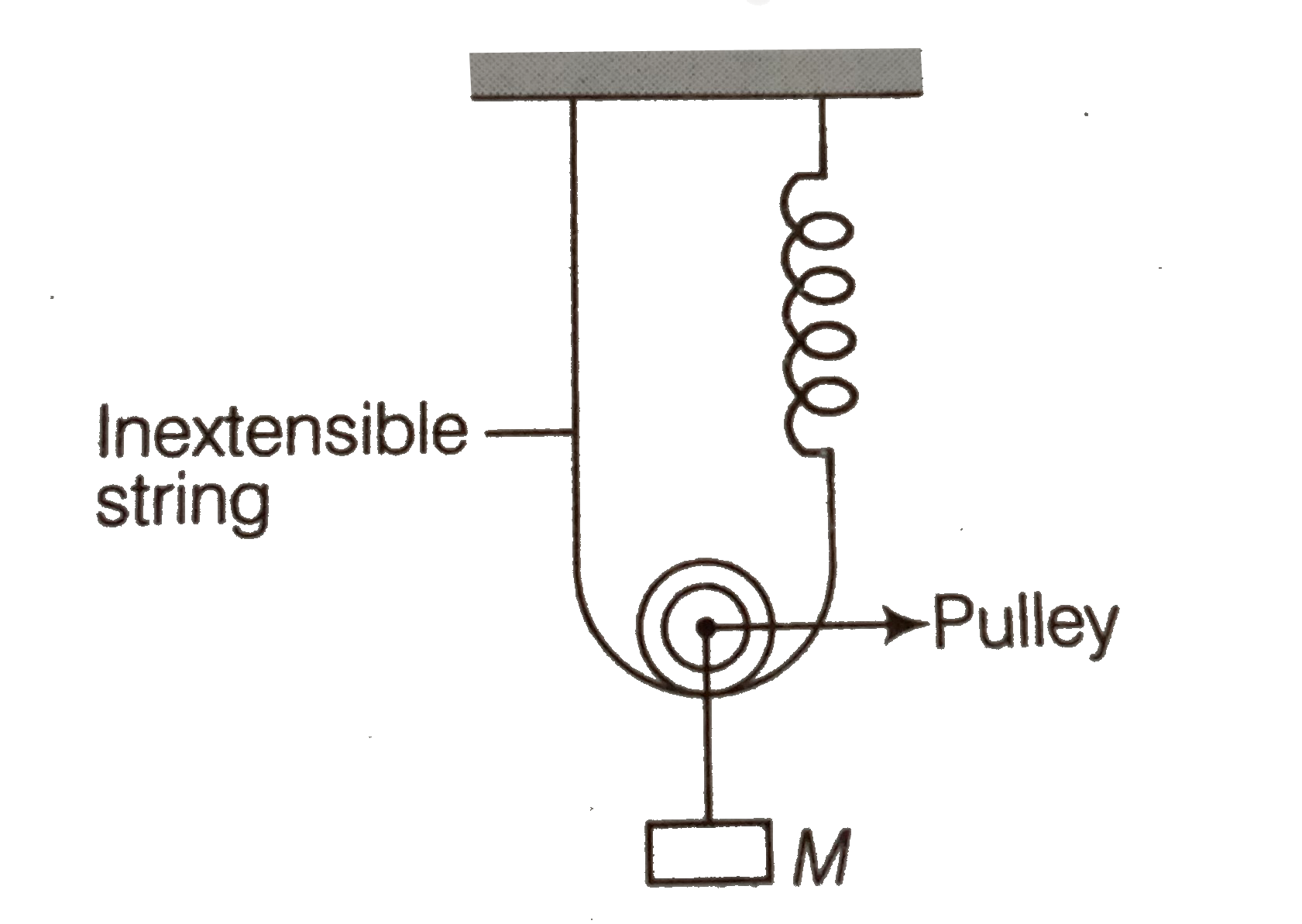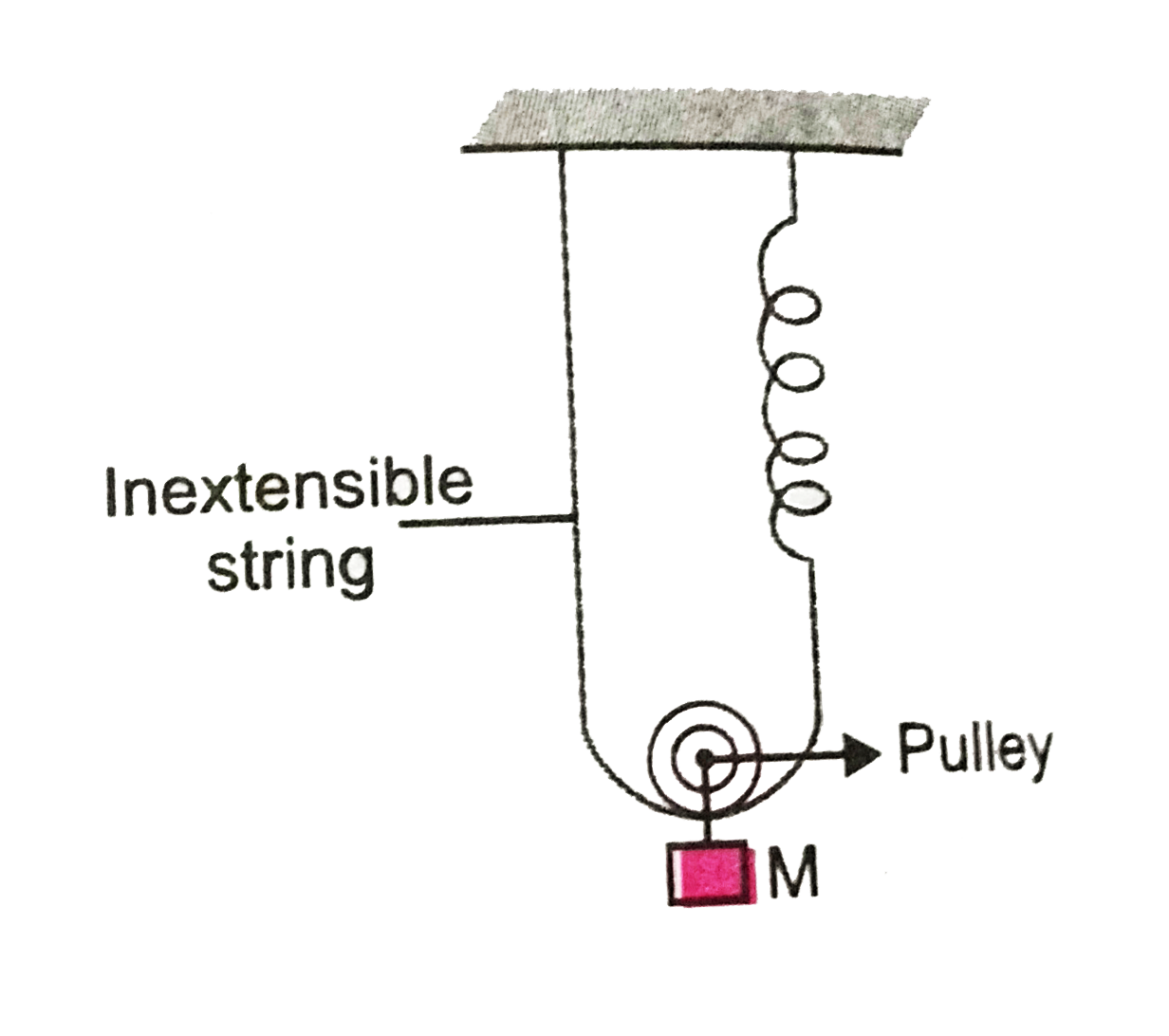A vetical spring fixed at its upper end can be elongated by 2 cm under the action of a stretching force of (80g) g. A body of mass 600g is attached to its free end , and then the system is displaced from its equilibrium position by 8 cm . Find the energy of the system at this position. The mass is then released. if the energy is conserved , find the velocity of the body 4 cm away from its equilibrium position [g=1000cm⋅S−2]
Spring constant,
k=80g2=40×1000=40000dyn⋅cm−1
Elongation of spring due to a force of (80g) g=2 cm
∴ Extension of the spring due to the mass of
600g=2×60080=15cm.
Potential energy of the spring at this stage
=12kx2=12⋅40000⋅(15)2=45×105erg
Energy required for a further 8 cm elongation
=12×40000×82=12.8×105 erg
∴ Total energy of the system
=(45×105+12.8×105)=57.8×105 erg.
Again, potential energy for a displacement of 4 cm from the equilibrium position
=12×40000×42=3.2×105 erg
∴ Kinetic energy in this condition
=12.8×105−3.2×105=9.6×105erg.
If the velocity of the body is v , then
12mv2=9.6×105or,v2=2×9.6×105600
or, v=56.568cm⋅s−1.
Topper's Solved these Questions
- WORK AND ENERGYBook:CHHAYA PUBLICATIONChapter:WORK AND ENERGYExercise:SECTION RELATED QUESTIONS
Explore 24 Videos
- WORK AND ENERGYBook:CHHAYA PUBLICATIONChapter:WORK AND ENERGYExercise:HIGHER ORDER THINKING SKILL (HOTS) QUESTIONS
Explore 38 Videos
- WBCHSE QUESTION PAPER -2019Book:CHHAYA PUBLICATIONChapter:WBCHSE QUESTION PAPER -2019Exercise:SECTION - II ( GROUP -D)
Explore 10 Videos
Similar Questions
Knowledge Check
A body of mass M is attached to the lower end of a metal wire, whose upper end is fixed . The elongation of the wire is l.
ALoss in gravitational potential energy ofM is MglBThe elastic potential energy stored in the wire is MglCThe elastic potential energy stored in the wire is 12MglDHeat produced is 12MglOne end of an unstretched vertical spring is attached to the ceiling and an object attached to the other end is slowly lowered to its eqilibrium position. If S be gain in spring energy and G be loss in gravitational potential energy in the process, then
AS=GBS=2GCG=2SDNone of these
Find the time period of mass M when displaced from its equilibrium position and then released for the system shown in figure.

View SolutionFind the time period of mass M when displaced from its equilibrium position and then released for the system shown in figure.

View SolutionA body of mass M is attached to the lower end of a metal wire, whose upper end is fixed . The elongation of the wire is l.
View SolutionA cart of mass 2.00kg is attached to the end of a horizontal spring with force constant k=150N/m. The cart is displaced 15.0cm from its equilibrium position and released. What are
(a) the amplitude (b) the period ( c) the mechanical energy (e) the maximum velocity of the cart ? Neglect friction.
View SolutionA cart of mass 2.00kg is attached to the end of a horizontal spring with force constant k=150N/m. The cart is displaced 15.0cm from its equilibrium position and released. What are
(a) the amplitude (b) the period ( c) the mechanical energy (e) the maximum velocity of the cart ? Neglect friction.
View SolutionOne end of an unstretched vertical spring is attached to the ceiling and an object attached to the other end is slowly lowered to its equilibrium position. If S is the gain in spring energy and G is the loss in gravitational potential energy in the process, then
View Solution

